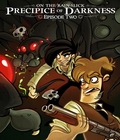Genre: Adventure
Publisher: Hothead
Developer: Hothead
Release Date: October 29, 2008
I have no idea how to describe this game to anyone who doesn't already read "Penny Arcade." By the same token, I cannot honestly recommend it to anyone who doesn't already read and enjoy "Penny Arcade."
Penny Arcade Chronicles: On the Rain-Slick Precipice of Darkness, Episode Two is a gleefully insane, anachronistically profane pulp-adventure parody, set in 1922 in the city of New Arcadia, with Tycho and Gabe as the owners and employees of a detective agency called Startling Developments. In an attempt to save the city from a giant robot, made by equal parts mad science and black magic, they recruit a third party member — the player — and head out to figure out what's going on.
Penny Arcade Chronicles is funny, above and beyond anything else. Trying to discuss it seriously in a review context almost feels like I'm missing the point, because the point is basically to throw as much weird non sequitur crap at the player as possible in an attempt to get a chuckle out of him. Item descriptions, period-inaccurate dialogue, Gabe being dumber than paint, and constant joking allusions to how you can't get anything done without beating two dozen people to death with a garden hoe are pretty much what this game is all about.
Again, if you read "Penny Arcade," you're familiar with this kind of humor, where Tycho gets a lot of mileage out of muddled verbiage and people using uncharacteristic slang. Gabe's cartoons lend themselves remarkably well to the game's setting and environments, and the animation actually works to enhance it. I wasn't sure if Gabe's stuff could handle being animated, but it's just fine.
You play the game by exploring the world, looking for clues and items that let you get around obstacles, bribe characters, or get closer to figuring out who made the robot and how. Every item you can interact with gets a pop-up icon when you get close to it, removing a lot of the guesswork. A lot of things just give you a short description, but again, Tycho's writing does a lot to liven it up.
When you encounter hostility — and you encounter a lot of hostility — you switch to the combat engine, which is probably the most flawed part of the game. Penny Arcade Chronicles uses a turn-based system to handle combat, where the longer you wait for a character to take a turn, the more options you have.
You find combat items freaking everywhere, and the boxes they're found in respawn quite often, so you're encouraged to use them as often as possible to damage or debuff the enemy, or heal and buff yourself. Using an item in combat takes almost no time, while a standard attack takes a bit longer, and launching a character-specific special attack makes you sit there and wait for about a minute. As you go through the game, you also acquire various NPC helpers who can use special moves in combat, which slowly recharge over time once they're used.
When you land a successful attack on an enemy, the character you used gets a hit added to his counter. As the counter goes up, so does the character's attack stat; as you get up to 20 hits or more, you start inflicting markedly increased damage. Unfortunately, if the character gets hit, the hit counter resets to zero. You can tap the left trigger to block an incoming attack, and the most opportune time to block is indicated by flashing text on the enemy's life bar, which requires fairly precise timing and practice.
In general, I'm in favor of anything that avoids the big problem you run into with a lot of turn-based RPGs, where you fight all the time and you win 90 percent of the fights by choosing Attack with every character on every turn until you win. That wasn't fun, although it did lend itself to the occasional evening of assisted meditation, and I applaud anyone making an RPG that doesn't include it.
The problem with Penny Arcade Chronicles' system, though, is that the block cue is so small, and the timing required so precise for many of the enemies in the game, that it might as well not be there at all. I was playing this game on a television set the size of God, and I could barely see the block cue. Without a high hit counter, standard attacks tend to do remarkably little damage, which meant most fights devolved into abusing special attacks and items to end the battle as quickly as possible.
That's more an issue with combat's expediency than combat itself, to be fair. Penny Arcade Chronicles: On the Rain-Slick Precipice of Darkness, Episode Two is chiefly a 10-hour version of one of the comic strips, with all that implies. If you've never read it, take a quick look through their archives. If you laugh, you'll enjoy Penny Arcade Chronicles, although the combat system just isn't entirely successful. If you don't laugh, or worse, if you're offended, you won't like this game.
Score: 8.5/10
More articles about Penny Arcade Adventures: Ep. 2












 The madcap Penny Arcade experience continues in Episode Two where gamers return to the deranged 1920s universe of New Arcadia and rejoin Gabe and Tycho of the Startling Developments Detective Agency to visit crazy new areas, combat bigger and badder enemies, solve even more wacky puzzles and get ever closer to unraveling the mystery in the sinister heart of New Arcadia.
The madcap Penny Arcade experience continues in Episode Two where gamers return to the deranged 1920s universe of New Arcadia and rejoin Gabe and Tycho of the Startling Developments Detective Agency to visit crazy new areas, combat bigger and badder enemies, solve even more wacky puzzles and get ever closer to unraveling the mystery in the sinister heart of New Arcadia.










